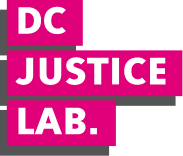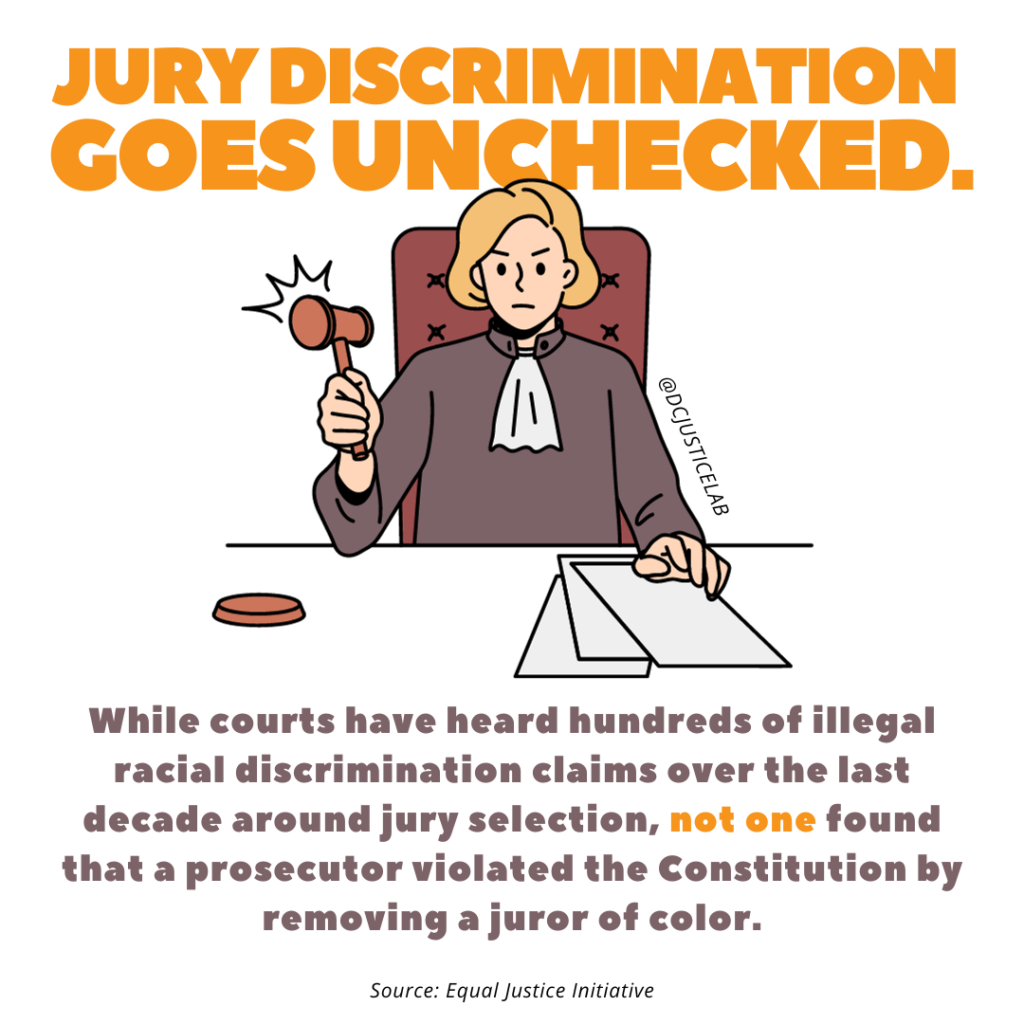
Jury Selection
Jury service is a key civic duty – peremptory challenges prevent Black people from serving.
- 4 Minute Read
Either the prosecutor or the defense can reject a potential juror without giving a reason; these are called “peremptory challenges.” In DC criminal trials, each side is allowed ten of these peremptory challenges. These challenges make trials longer, inflate costs, and have been used to discriminate against jurors on the basis of race. Peremptory challenges have not been proven to increase the likelihood someone will be convicted. While the Supreme Court banned jury challenges based on race, prosecutors have found other ways to eliminate jurors that have a racial bias (like, whether one knows someone convicted of a crime). Some places, like Arizona, have eliminated peremptory challenges altogether. Washington, California, and Connecticut have changed laws or procedures to reduce racially biased reasons to exclude a juror. Neighboring Arlington County, Virginia voluntarily eliminated the use of peremptory challenges in jury selection.

What you need to know
DC allows lawyers on both sides of a case to reject a potential juror without stating a reason.
The DC Superior Court allows peremptory challenges – something that in the courts words, “may be used to reject a certain number of prospective jurors without giving a reason.” While in a 1986 ruling, the Supreme Court made it illegal to eliminate prospective jurors based solely on race and established a test to show it is “purposeful discrimination,” having an open ended ability to exclude someone from a jury creates a loophole around that process. In the case of Curtis Flowers, the Supreme Court found that when a prosecutor used peremptory challenges on five of six black jurors in Mississippi that resulted in a jury where 90 percent of jurors were white, there was evidence that the motivation was discriminatory intent. As U.S. Supreme Court Justice Thurgood Marshall offered, as a practice, judges rarely “second guess” prosecutors’ reasons for challenging jurors.
Black people are disproportionately removed from juries.
In Georgia, 80 percent of peremptory challenges were used to eliminate Black jurors. In Louisiana, prosecutors used nearly 60 percent of their challenges to remove Black prospective jurors, even though only 33 percent of the potential jurors were Black. In Mississippi, Black jurors were found to be four times more likely to be struck than White jurors. In California, 72 percent of peremptory challenges were used against Black jurors, while less than 1 percent of challenges were used against White jurors. While the DC courts do not report data on jury demographics as part of their annual reports, the rulings by the DC Court of Appeals have found, there is implicit bias in trial outcomes, and courts are obligated to ensure racial fairness in jury trials. In one case, the DC Court of Appeals found a prosecutor used challenges predominately against black women, “on an assumption that a black woman juror, because of her race, would be favorable to a black defendant.”
Ending challenges would cut court costs, shorten trials and increase fairness.
One estimate shows that, including court costs and the costs of jailing an individual pertrial, DC taxpayers spend a minimum of $9,000 per trial. Ending peremptory challenges means that each juror called to trial would be used, reducing costs per juror. There could be additional cost savings because changing the practice of challenges would shorten the time of cases. Changing the practice of peremptory challenges would also restore rights and reduce bias by having a jury that reflects the population and community norms in a place, increasing fairness in court cases for Black people.
Other jurisdictions have limited or ended the use of peremptory jury challenges.
Other jurisdictions in the U.S. and internationally have made changes to peremptory challenges or eliminated them altogether. In 2021, Arizona became the first state to eliminate peremptory challenges. Washington state enacted a policy, Connecticut courts issued a rule, and in 2020, California passed a law that severely limited the use of challenges based on whether someone had prior contact with law enforcement, lived in a high crime neighborhood, or expressed distrust in the criminal justice system. Prosecutors in neighboring in Arlington County, Virginia voluntarily eliminated the use of peremptory challenges in jury selection. In 1988, the United Kingdom and Canada eliminated peremptory challenges.
WHERE TO LEARN MORE
Equal Justice Institute 2021
University of California at Berkeley Law: June 2020
Connecticut Courts July 2022
National Association of Attorney Generals
New York State legislation 2021
Washington state April 2018
Washington state January 2022
Our Solutions
DC Should:
- Require the courts to publish demographic data on peremptory challenges
- Restrict or eliminate peremptory challenges in jury trials
special thanks
Nicole Rinconeno ★ Haleigh Sinclair ★ Eden Kinlock



